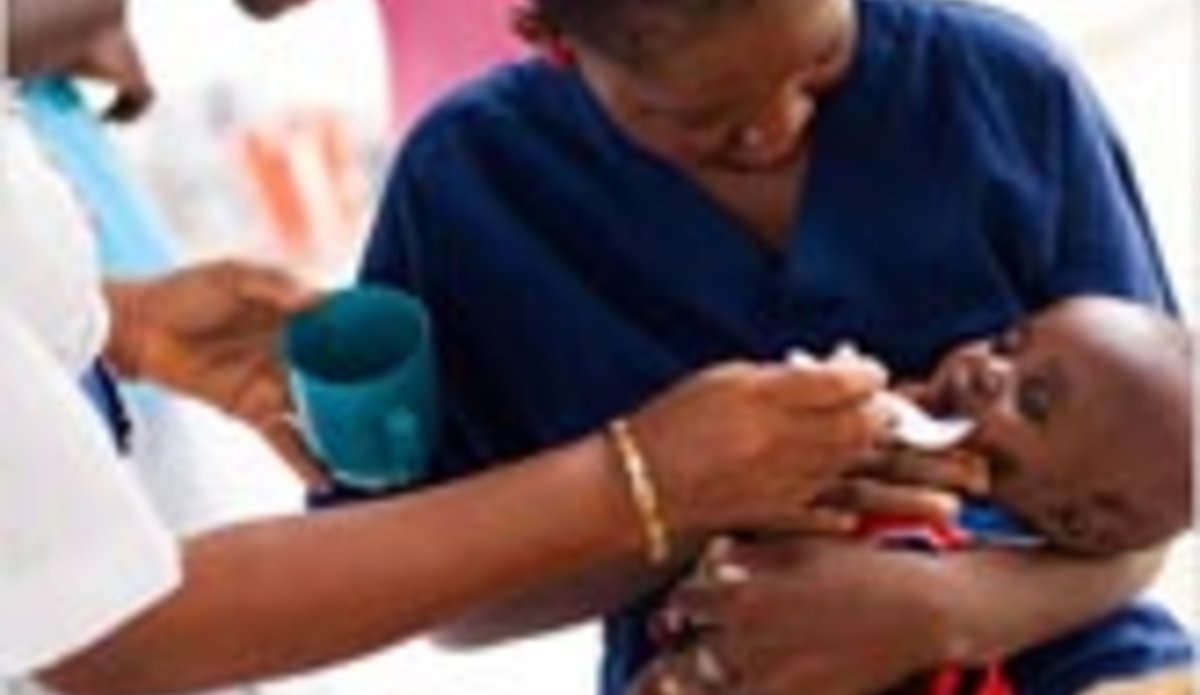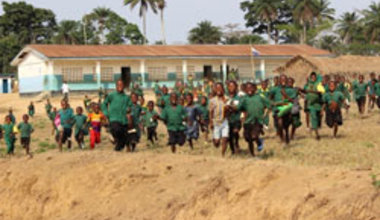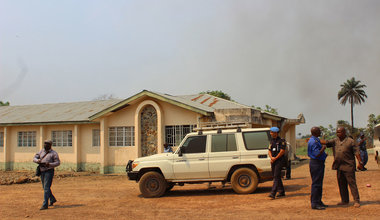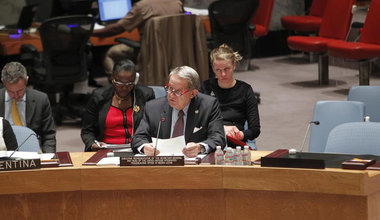Supporting Country-Wide Efforts To Help Mothers and Babies and Reduce Malnutrition
A nation's future depends on a healthy next generation. Sierra Leone faces a major acute malnutrition problem: of every three children, one is underweight. The United Nations Joint Vision's efforts to combat this poor nutrition status, which is contributing to the country's very high rates of child mortality, is described in this feature story showing how community members are trained to identify children failing to thrive, and are providing the therapeutic feeding, nutritional supplements and know-how needed for recovery and prevention.
Six or seven women sit or sprawl on the iron bedsteads and bare mattresses in the small, hot room known as the Stabilization Centre at Tonkolili, Sierra Leone. Each has a tiny, cloth-wrapped bundle. Some women are lethargic, others have tense, drained faces. Fold back the brightly patterned cloth of any of the bundles and the cause of their exhaustion is revealed: a sick baby, with a red, anguished face and the shrivelled frame that indicates severe malnutrition. Abdullai Sukuray is the Community Health Officer in charge. "If the women come here too late, the babies die," he says. "It makes me very sad when that happens. Sometimes I cry. I don't eat and my wife worries that I find this job really difficult to cope with."
A major acute malnutrition problem
The evidence of malnutrition, low birth weight and stunting clearly demonstrates Sierra Leone's poverty, marked by its place at the very bottom of the Human Development Index league table. One in three children in the country is underweight, while 284 of every 1000 babies born will die before they reach the age of five. The UNICEF-supported Stabilization Centres are one part of a massive country-wide effort to change this. The overarching aim is to help Sierra Leone meet the targets of Millennium Development Goals 1 and 4 to reduce prevalence of malnutrition and halve the current infant mortality rate. UNICEF is one of 16 agencies working with the UN's Integrated Peace Building Mission in Sierra Leone on a Joint UN Vision. The United Nations Joint Vision aligns with the Government's poverty reduction plan, the Agenda for Change, channeling the donors assistance.
Weight gain in a matter of days
Mothers usually stay 10 days at a Stabilization Centre while their babies receive therapeutic feeding. As the reinforced foodstuffs start taking effect in days, the babies are regularly monitored for the signs of vital weight gain. For the mothers there is a daily teach-in on subjects such as handwashing with soap and exclusive breastfeeding. Each morning they assemble round the stove in the courtyard and learn about making weaning foods using locally available vegetables and cereals. Sukuray lists the inevitable precursors of the babies' malnourished state: the malaria bouts, the frequent diarrhoea attacks. These stem from the conditions in the villages, he says. In some cases mothers are too poorly nourished themselves to have much breastmilk (47 per cent of Sierra Leone's population is underweight.)
Outreach and rapid referral saves lives
Sukuray acknowledges, "It's pathetic; it's not their fault that they don't know what to do - but these problems should be spotted earlier in the community." To increase knowledge and help to handle cases better at the village level, a countrywide Community Management of Acute Malnutrition scheme is being supported by UNICEF. Community Management of Acute Malnutrition is implemented at Outpatient Therapeutic Programme sites which receive supplies of Ready to Use Therapeutic Food.
Community involvement and knowledge is the key
At the Outpatient Therapeutic Programme mothers or caregivers receive a regular distribution of "Plumpy'Nut", a high-calorie food. Plumpy'Nut helps maintain weight gain in conjunction with the improved diet the mothers have learned to provide. As Sierra Leone moves toward fulfilling the vision of free healthcare for women and children launched by the Government in 2010 Sukuray says, "I want to believe that we can handle these health problems ourselves if we have more prevention at village level and make sure all women have a source of clean water, learn about good hygiene and know where to get help when they're pregnant or have a sick baby."
.................................................................................
Photo: UNICEF/Olivier Asselin - Therapeutic feeding with specially fortified food - if given to a malnourished child in time - is a life-saving intervention, able to turn round a child's nutritional status in a matter of days.
Text: Julia Spry Leverton
 UN
UN




